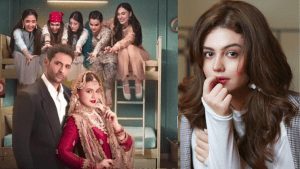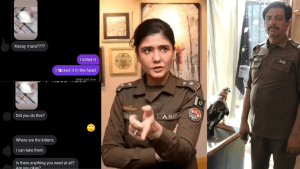When will our entertainment industry learn to take accountability for the problematic stereotypes it continues to churn stories out of? For a country like Pakistan where more married women suffer from domestic violence at the hands of their in-laws and are told to keep staying and trying hard, our entertainment channels continue to brush realities under the carpet to make dramas that do not empower women to be independent.
This conversation reignited throughout the internet when a clip from the drama “Angna” was shared where a mother-in-law is seen criticizing her daughter-in-law’s clothes, and then the latter is slapped by the groom for daring to question the mother’s opinions.
Many users had to criticize how our channels have consistently kept normalizing male-leads who are “man-children”, the men who have not learned how to be independent without their mother’s help, and have an abusive attitude towards their wives. In a time when feminist activists are reporting the rise of violence against women in our society as the Pakistan Demographic and Health survey revealed in 2018 that 28 per cent women between the ages of 15 to 49 have experienced intimate partner violence in their lifetime, it’s worrisome to think back to some of the top rated dramas in our industry have routinely normalized men who abuse their wives on the suggestion of their mothers. Like the popular drama “Humsafar”, where Ashar refused to consider Khirad’s perspective and believed his mother’s false accusation that she had been having an affair with Khizar. Or the drama “Ishq Hai” where the male lead falsely accuses his wife of having an affair after believing the lies of his family members, and then stalks her secretly to even act aggressively when he finds out she has been visiting her ex-fiance’s house
With how deeply troubling ways the entertainment industry keeps normalizing marital violence and abusive in-laws, who is looking out for the little girls who are watching these shows on screen? Especially for young women in Pakistan who are often pressurized to make marriage a central goal in their life, why aren’t we teaching them that they deserve better than abusive mother-in-laws who do not let them build an independent life with their husbands?
Twitter has led discussions with young women opening up about the violence they have witnessed married women facing from their in-laws, and how such toxic relationships can destroy families when men refuse to stand up for their wives. Twitter user Sophia Ahmed recounted an instance of witnessing a friend who lives far away from her mother-in-law who still refuses to allow her to exercise her own choices.
So a young friend’s mother in law told her over a video call, that you should wear shalwar kameez when you go out.
Friend lives in Mississauga.
This is how toxicity enters relationships
— Sophia Ahmed (@sophiaahmed) July 30, 2021
Psychologist Maheen Ghani also stepped in to share how abusive in-laws can emotionally and physically drain women because they are consistently policed and dealt with violence and taunts if they ever stand up for themselves. And this is the content that our television shows refuse to show on screens because of deeply inconsiderate we have become to the plight suffered by married women in Pakistan
In Pakistan it feels like you are married to your mother in law – not even your husband. The abuse, the interference, the trauma. At any point you can be told to leave. And when it becomes toxic enough. You do. These same women raise these entitled sons. Patriarchy runs deep.
— Maheen Ghani (@maheenghani_) July 30, 2021
Our entertainment industry needs to change the narrative to help more women recognize that abuse is not an act of love, and that they have the right to leave abusive marriages where they are not welcome or accepted.










